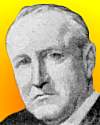 (source)
(source)
|
Waldemar Kaempffert
(27 Sep 1877 - 27 Nov 1956)
American science writer and museum director who was a writer of science articles and editor for various magazines and books, including Scientific American, Popular Science Monthly, Harper's Magazine, and The New York Times.
|
Science Quotes by Waldemar Kaempffert (3 quotes)
[The launch of Nautilus, the world's first atomic submarine] marked a transition in naval warfare—a transition as sudden as that associated with the Monitor.
— Waldemar Kaempffert
In 'Science in Review: Atomic-Powered Submarine Marks a Great Transition in Ships and Land Plants', New York Times (24 Jan 1954), E11.
In size the electron bears the same relation to an atom that a baseball bears to the earth. Or, as Sir Oliver Lodge puts it, if a hydrogen atom were magnified to the size of a church, an electron would be a speck of dust in that church.
— Waldemar Kaempffert
Quoted in 'Science Entering New Epoch', New York Times (5 Apr 1908), Sunday Magazine, 3.
The history of penicillin is one of the disgraces of medical research. Fleming published his
classic paper in the British Journal of Experimental Pathology for June, 1929, but it was not until 1939 that Florey followed up the clue. An antiseptic which is almost ideal, inasmuch as it has no toxic effects, was allowed to slumber for ten years. Had it not been for the exigencies of the present war it might be slumbering still.
— Waldemar Kaempffert
In book review, 'The Story of a Neglected Miracle', New York Times (25 Mar 1945), BR3. (The book being reviewed was J.D. Ratcliff, Yellow Magic: The Story of Penicillin.)
See also:
- 27 Sep - short biography, births, deaths and events on date of Kaempffert's birth.
 In science it often happens that scientists say, 'You know that's a really good argument; my position is mistaken,' and then they would actually change their minds and you never hear that old view from them again. They really do it. It doesn't happen as often as it should, because scientists are human and change is sometimes painful. But it happens every day. I cannot recall the last time something like that happened in politics or religion.
(1987) --
In science it often happens that scientists say, 'You know that's a really good argument; my position is mistaken,' and then they would actually change their minds and you never hear that old view from them again. They really do it. It doesn't happen as often as it should, because scientists are human and change is sometimes painful. But it happens every day. I cannot recall the last time something like that happened in politics or religion.
(1987) -- 


